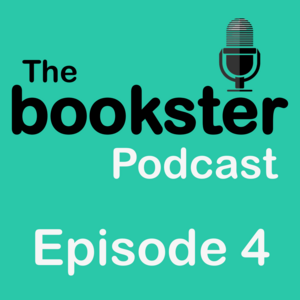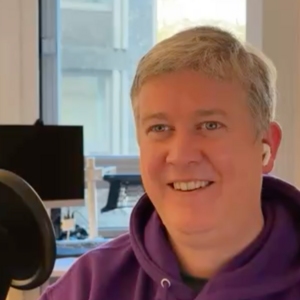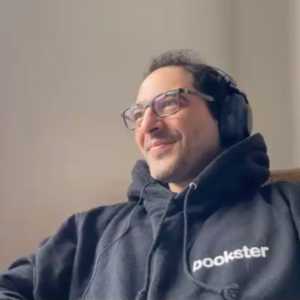The Bookster Podcast: Help and Support Key Pillar
- Episode 4
Who's Talking?
- Simon Beattie
- Robin Morris
- Adam Aaron

High quality support is at the heart of how Bookster provides it's service
In the Bookster podcast with host Simon Beattie, CEO Robin Morris and support lead Adam Aaron discuss the company's approach to onboarding and supporting clients.
Key takeaways
They emphasize a personalized onboarding process tailored to each client's needs, aiming for simplicity and effectiveness.
While Bookster offers self-guided initial setup, they highlight the importance of hands-on support to ensure clients effectively utilize the software.
Their approach includes using emails and direct interactions to guide clients through setup, although challenges arise when clients overlook essential steps like configuring payment gateways.
Beyond initial setup, ongoing support involves maintaining open communication and managing client expectations to prevent misunderstandings about the software's capabilities.
Bookster values personalized support, recognizing that different clients require varying levels of assistance based on their familiarity with technology and business operations.
If you're enjoying this series, please follow us, and join us next episode as host Simon and CEO Robin Morris delve into the third foundational pillar of the company: ease of use.
Credits
- Editor
- Simon Beattie
- Music
- Jonathan Brannen
- Producer
- Joint Beat Productions
Subscribe
Transcript
- Hello, I'm Simon, and welcome back to the Bookster podcast from inside the SaaS holiday rental software company Bookster based in Edinburgh, Scotland.
Minute 1
- Now, I'm joined today as always by CEO and co-founder of Bookster Robin Morris.
Robin, thanks for joining me again.
Hello.
And, uh, we're lucky that again, uh, we're joined by, uh, support lead Adam Aaron from Bookster.
Adam, thanks for giving us some more time.
No problem.
Um, I think, uh, we're in sort of episode two of our mini series journey exploring the, the four pillars of Bookster.
Uh, last time we talked about the low barrier to entry.
Uh, this week we're going to explore how, uh, Bookster supports and helps clients, uh, use, uh, the software.
Um, so I think we're gonna dive into a bit of that this week.
So if you're ready, gents.
Um, I think the first thing we should probably talk about is onboarding, uh, of new clients.
Um, now you onboard clients on a one-to-one basis. Minute 2
- Um, I guess Adam, that sort of falls into your realm.
Um, what sort of time do you spend with a, a new client doing the sort of onboarding process? Um, so, so initially, I mean, I suppose last, last, uh, episode we discussed low barrier to entry.
And one of those, uh, would be self sign up.
So when, uh, a customer signs up, uh, they'll get a series of messages, uh, from us that will give them some self guidance in, in, um, in the initial instance, uh, and try and get them as far along the process of, of almost self onboarding, uh, as as possible.
Um, so thing, things like setting up a payment gateway, these are all things they can technically do themselves.
Uh, if they have done 'em, it makes the onboarding process generally smoother.
Um, not everyone does them.
Um, you will, you will get clients that that don't, um, that haven't activated their subscription Minute 3
- before they've onboarded.
Uh, so that's sort of the first thing you do, um, is, is a, a, um, get them to get them to pay for Bookster essentially because, uh, on onboarding is part of, of the service, but obviously the service is paid for.
So, um, And I suppose as far as how much I was gonna say that, um, we, so this is interesting to other SaaS companies, if you, if you're sort of running a SaaS company, so we, when someone registers or signs up, we send out these emails as Adam says, trying to get people along the process or give them advice or tips and, um, uh, yeah, I mean, most people just, they, they're quite simple and easy to read, but you know, a good chunk of people just don't read that kind of thing.
So by the time they come to book in with Adam, You touch on something, Robin, Robin that a good chunk of people, you know, can read, they don't read. Minute 4
- Um, and, and I think that's, I mean, you've got, you've gotta, you know, you've got to cover all sorts of things and, and, and support, but most of our support is gonna be email based, which is written, but there's, there's a certain amount you've gotta assume people are just glancing at it and looking for, for the bit of information they want and ignoring the rest.
So there, there's a definite knack to getting that.
And, and it's almost, it's almost, um, you, you'll, you'll almost change your tact with people as you get to know 'em as well.
The messages will become shorter and shorter.
You know, there's certain processes will be one word answers, and you don't even bother signing them off, you know, anymore because you're on, you know, that that sort of terms with, with your customers.
But, um, in, in terms of a, a new customer, um, get, getting 'em to the place where they're on onboarding, Minute 5
- generally we want 'em in a certain place.
It's not always possible.
Um, the, the messages I've referred to, you know, try and get 'em in that place.
If not, then the general process would be get getting 'em as far as you can with within the time, uh, allotted.
But it may be a question of doing a follow up meeting as, as well.
Uh, and I mean, how, in terms of your clients generally, how, how long do you spend on an onboard session with somebody? A session? I would, I would always want to keep, um, to, to an hour or, or less if, if possible.
It's not always possible.
Um, and depending on, on their enthusiasm, um, and, and the types of questions they're answering, sometimes they do go on longer.
Sometimes if they do go on too long, I will cut it short and to say, look, let's, you know, let's, let's meet again.
Um, I'm not expecting you to have taken in everything, you know, I've, I've told you today, Minute 6
- because people just don't pay attention after for a while.
And there's a certain amount of, of that comes with the territory, I suppose.
Um, but they, they will generally, you know, you'll, you'll get a, you'll get a feel from it usually within the first minute or two of, you know, what, what kind of onboarding it's gonna be.
Right.
Sure.
I mean, do you, um, produce, uh, sort of video manuals for them at all and things they can refer to themselves? Or is, is it just purely your sort of one-to-one? So we, we, in, in the first instance, we tried to make the software as intuitive as as possible.
So, you know, good, good software as, as a goal.
And I'm not saying this is always, you know, is always possible or, or achieved, but as, as a goal, certainly, um, you, you want to make something self-explanatory.
And, you know, in a perfect world, my job wouldn't exist.
Um, it's not a perfect world and we're not a perfect company by any means.
You know, we, you know, everybody is, Minute 7
- has got imperfect sense and yeah.
Break it to you, Robin.
Um, I, I, in terms of, you know Yeah.
Is that always, always done? No, it's, it's not, it's not, uh, always possible to, to do that.
So, you know, of course I'm on on hand to answer questions.
Um, video manuals tend not to do, the main reason is it software changes and if you've got a video, it's, it's not gonna be, it's not gonna be relevant for very long.
And it's, there's a lot of, there's a lot of, uh, effort goes into producing something, editing something, et cetera.
The is out of date pretty much as, as soon as it's done.
Um, you know, for, for things like where, you know, where it's, where it's concepts, um, that aren't gonna change, I suppose a, a video would would work, but even that, I would say things like, you know, you'd want like animation or something to, you know, to express what you're doing. Minute 8
- That's, that's all a lot of of production for what I would consider not that much payoff because just like people don't read, they also don't watch.
And sometimes the best thing to do is just have a quick conversation with someone.
Uh, do we get asked the same question over and over sometimes, um, by the same person.
I mean, yeah, sometimes, um, you know, is, is that something we could improve on? Probably.
Um, but I, I think the general approach ha has been, um, I mean we, we work, I dunno if it if it's been, um, gone through yet, but you know, as far as being a agile, we, we work in an agile way.
So it's, it's very much, uh, like a constantly evolving thing.
I mean, I, I almost think of ourselves, you know, as, as a, as an organic thing, and that includes our, our clients as well.
And we're, you know, as, as we change, as they change as the industry, you know, changes, we're, Minute 9
- we're all moving along with that.
And I think from a support perspective, that that has to be the approach as well is it does have to have to, you know, change.
And the quickest way to do that is usually a conversation with someone.
Yeah.
I mean, I, a conversation is, um, you know, it, it addresses tone, uh, you get quick feedback, you understand what their problem really is.
They may have worded the problem in such a way that it's easy to misunderstand what they're actually asking.
So yeah, having a quick phone call or, you know, in an onboarding session, there's a lot of backwards and forwards, um, that it's, it's much, much easier to address those questions.
There's also a lot of, I think because we're a B2B company, there's a real tendency to start using acronyms.
Um, and we, you know, without us knowing that we're doing Minute 10
- that, we'll start using them.
Like saying OTA, for example, that's online travel agency, which refers to, oh, I've been pronouncing it ota, oh Man.
Um, which is like, um, uh, you know, booking.com or Airbnb, et cetera.
Um, they're their OTAs, or I dunno, like even a payment gateway or, um, I cal there's, there's all these terms that we use that for us, we know exactly what they mean, we know what they are.
But someone who's just letting out their holiday home or, you know, starting a business with a, a Shelly or something, they, they don't necessarily know what these are.
And so the onboarding process, a lot of it is, or some of it is just making sure that, you know, we're starting to speak the same language together as well.
Um, yeah.
So when does, um, you know, when I don't, what do you, if you can sum it up in a couple of minutes, I guess, Minute 11
- what do you cover in onboarding and when does onboarding become just general support? I mean, what is the, the line? So, I mean, the, the onboardings, we, we actually started them out.
We, we noticed the people we're signing up to Bookster, uh, getting bookings and, and their settings were, were incorrect for how they were running their business.
Um, so in other words, they were using the default settings.
In other words, they had not looked at the settings at all, and settings, preferences, uh, the sort, the same thing.
So, so in inside the software, there's a section where you're, you're basically configuring it to your needs.
So things like, um, an an initial payment versus a minimum payment, uh, versus when the balance is due for a booking.
Uh, all of those things are defined in settings and they all affect each other.
And, and this just wasn't, wasn't being for some reason, um, Minute 12
- you know, looked at, I suppose from, from a geeky point of view, I would consider myself quite, you know, quite nerdy in terms of software.
That's the first thing I would look at.
But from a, um, rental company, maybe they wouldn't.
So the onboarding, its, its first goal was, was to go through the setting.
So that's generally still what I do.
I will, I will start with, with the pre preferences, ask 'em some questions about how they're running their business, uh, where they're getting their bookings from.
Um, that will indicate to me whether we need to, you know, connect, connect to the OTAs as, as Robin me mentioned earlier, um, you know, when, where whether they, uh, need to define their currency are, are they in Europe, are they, uh, in America, et cetera, et cetera.
Um, all, all of those things need to be set before you're getting bookings in the sunshine.
Uh, so the, the onboardings originally were, were to, to just go through the settings as we've done it for, Minute 13
- for the past several years.
It's developed into a more, I wouldn't say concrete process 'cause it is quite fluid.
'cause it very much is based on the individual that, that we're, we're doing it for or company, uh, you know, depends as, as well.
Um, how comfortable are they using software in general? Sometimes the onboarding, the first 15 minutes is how do I get the camera working? Uh, which, you know, is is not much like this podcast To be.
I mean, you know, it's, it's, it's, it's the way, the way the world is, I suppose.
But, You know, there's, I was looking at your, uh, light shade for most of the start of this album too.
I, you know, I'm, I'm just as guilty of it as, as, you know, the, the people I support.
But it, it, yeah, it, it's, you know, how do you get in contact with us? You know, you know, obviously they're talking, you know, to me it's like, do you know, do you know how to, how to reach support? You know, making sure that they're, they're aware Minute 14
- of all different ways they can get support.
Um, in, in general though, like, you know, the longer you go on, the less attention.
They're, they're gonna pay to you.
So you, you need to get the most important things, uh, from our experience, uh, you know, I don't want a customer to get bookings in, at, at the wrong price.
Um, I don't want them to get double bookings.
I don't want 'em, um, to, to be, I suppose I covers the wrong process.
I say get getting pro, uh, bookings, uh, you know, just, just wildly different than what they're expecting.
So, so you need to find out what their expectations are.
The way they're, they're generally working, and it's a lot of, you know, thinking on your feet, but as a general rule, you're going, you're going, it's not a script as such.
You're just going from the top to the bottom through the settings.
If you covered that quickly, you know, depending on the, the confidence level, you can then move on to, you know, Minute 15
- to optimizing their properties, um, how they approach their, their pricing and, and advise how, how books to kind of accommodate that.
You, Um, you mentioned expectations sort of setting there.
I think that's quite important.
So we used to find that we, um, had quite a high number of people who would come along.
They would use Bookster for two or three months, and then they would disappear again.
And, you know, they'd cancel or whatever.
And we would manage to get in touch with 'em and ask them, well, why did you cancel? And it was usually because their expectations of what Bookster was or what it is, was different to what, how they'd set themselves up to use it.
So they might be like, oh, we didn't get any bookings.
It's like, right, well, you didn't actually connect to any channel, so you didn't connect yourself to Airbnb, didn't connect to booking.com.
So Bookster isn't somewhere that if you just log, if you, you just register for it, uh, and set a property up that you will get bookings. Minute 16
- That isn't how it works, basically.
It's not what, you know, it's only if you advertise through those channels that you're likely to get bookings, uh, or, you know, promote yourself.
So it, and also setting other expectations like, you know, um, what our pricing can do.
You know, how you can set your rates up, uh, how when they will get money from us, when they'll get money from, uh, you know, an OTA.
So that expectation setting is quite important, I think, as part of the onboarding process, so they understand what, what is we're providing to them and what we're not.
I suppose also, And I guess, I mean part of, excuse me, part of the ongoing, uh, relationship is that you would follow up after the onboarding is finished, I guess, to make sure these things are happening.
Yes.
I mean, we'll, we'll keep, we've got a, a process, um, you know, in, in place the, you know, we, we, Minute 17
- we regularly follow up, you know, with, with each, each client.
Um, and I mean the, I the idea is, yeah, to keep an open line of communication.
If you don't communicate with with us, we will communicate with you.
You can ignore that.
Um, and, and that's, you know, fine too.
Um, as long as you're, you're happy with the software and you're getting along fine, we don't, we don't mind.
Um, but what we do tend to find is that, well, if, you know, if we catch those, any sort of, if issue that they're having, um, and it might not even be with us.
It might just be something we can help with or advise on, then, then that's a good thing.
Um, so, so yeah, we've definitely found that that's, that's been helpful.
And we've mentioned a couple of times of about the size of the business.
Um, I mean, you, you don't have a huge amount of staff, so I mean, how do you cope with the sort of support and onboarding, et cetera? What sort of size of team do you put towards these things? Minute 18
- So a support lead, I suppose I, you know, it's my responsibility to sort of oversee that, but I'd say everyone, um, chips into a degree, you know, with, with support.
Anyway.
Um, you know, we obviously we're, you know, we're Monday to Friday sort of of thing.
We do, we do, you know, we do have lives outside of Bookster.
Um, but there, you know, there's a, there's a certain amount of sort of ex expectation in this day and age that everything will be instant.
And I think there is, again, managing expectations.
You know, if, if it's an emergency, obviously we'll take care of it straight away.
If it's can wait till Monday and it's, you know, submitted on, on Saturday, then then that's okay too.
And as, as long as there's that communication there that, that's what the, the client's expecting.
Um, in terms of how do we manage it, I'd say kind of ad hoc. Minute 19
- Um, we just kind of keep on top of it.
I don't really, I don't really know.
It just happens.
I mean, we do, so I should have a better answer for that.
It, for, for someone who knows literally nothing about, um, you know, uh, Booksters.
But, so we do have a ticketing system.
We use something called Zendesk and that so allows us to open a ticket that, so like basically create a, um, someone sends us an email, a support issue or something.
Everyone can see it in the team, can see how people are responding to it.
It can be passed around different people on the team.
So that's quite, that's pretty structured.
So ad hocs probably not the way to describe that, but I get, yeah, I guess what I meant ad hoc, I meant sort of get getting through.
I mean, it goes into a queue.
Um, yeah.
And we try, try to, to prioritize and, you know, there's, there's automation there to a certain degree of, you know, of how it's prioritized.
Um, so, you know, we are using technology in, in some, in some, um, respects to, to help manage that. Minute 20
- I suppose the other thing that's quite In terms of, yeah, sorry.
Important is, um, any response is a good response.
And it, I mean like any personalized proper from a human response is a good response.
Yeah.
Sometimes even I am looking into this, you is, is, or I don't know the answer, but I will find out for you guys, is is better than ignoring it for for two weeks.
Yeah, yeah, exactly.
Yeah.
I think especially in this day and age when everyone, like zero when everything is sort of instant, just to have something back is, is reassuring I guess, if nothing else.
Um, yeah.
Okay.
So, uh, good.
I mean, look, we're, we're sort of at 20 minutes already.
This is, this has flown past, uh, this week.
Um, so, uh, I mean, I guess, uh, maybe a last final question, uh, would be sort of from your point of view, are there sort of certain types of clients that are easier to deal with Minute 21
- and support, uh, than others? I mean, is there, is there, is there a type of accommodation provider that you find works better? Well, I would, I would say the, the best type of support request is, is when you get, um, a message shortly followed by a, nevermind, I've sorted this is is usually great.
Um, but, but in terms of, It's not so much a, a, a type of client in terms of the, the, the client.
It's more a personality thing, I think.
I think you, you can, you can have clients that are small and they're great to work with.
You maybe not gonna make as much money with them because of the size of their business versus, you know, massive agencies, um, that are equally nice to work with based on the personality of the people working with 'em.
So I think there's, there's very much a human element.
Um, is is the answer to that question really.
Um, you know, we, we'll, we'll work with you big or small.
We don't, we don't mind.
We're here to, you know, to, to help. Minute 22
- But in, in terms of pleasure to work with, I would say it is very much personality based.
It's Almost Also we do have clients that never contact us and never, you know, we reach out to them or try to speak to them and they, they really would rather not speak to us, but they're not, in a way, the nicest one that it, it almost, it makes you feel a bit nervous about like, are we doing something wrong? So it's quite nice every so often to someone just to say, you know, I'm just checking in and I've got a, we question about this, or a, we question about that, rather than radio silence the entire time, which is weird.
'cause you would think someone who literally never speaks to you might be quite, that's the easiest form of support.
But I dunno, I, Adam might have thought On that.
Yeah, no, I know, I know exactly.
I say those are almost two different questions though.
Um, yeah, I, I'm gonna stick with personality, Minute 23
- but I, I think, um, I, I think Robin has a, has a very good point.
The you do, you don't want a certain amount of, of communication even to know that things all right.
Even if it's just a, a friendly Yeah.
Things, you know, no problem.
I know how to get in touch.
Um, and I, and I'll if I need to.
Yeah, no, absolutely.
I think that's, and I think that's probably, um, you know, across any working industry at all, your point, Robin, it's, you know, if you don't, if you only hear from your boss when things are in trouble, then you're worried every time you hear from your boss.
But, uh, you know, if you're, if you've got that constant sort of ongoing relationship, it makes things a lot, uh, a lot easier.
Um, great.
Well look, I think we probably, uh, are gonna wrap this week up.
Um, thank you again both for your time.
It's been another interesting, uh, podcast.
Um, next week we'll look at pillar number three, uh, on your, your Four Pillars journey.
Um, we'll come to that though next week.
If you have any questions on what we've spoken about today, Minute 24
- as always, please send your emails to podcast at Bookster HQ com and we will get round to answering those questions on future episodes.
Uh, we've also got our sister podcast smashing your ho holiday rental goals, um, that's out in the world as well.
So, uh, we'll link to that in the show notes below if you'd like to listen to that.
And, uh, if you'd like to leave a favorable review for this podcast and for that podcast, that would be very gratefully received.
Right.
Again, gents, thanks for your time.
It's been a pleasure talking to you.
And, uh, for everyone watching and listening, we'll see you all again very soon.
Bye-Bye.
Thank you.
Bye afternoon.
Follow along as Bookster discussed their journey and their inner workings.
Thank you again for joining us, and we hope you find these conversations insightful and ultimately helpful.
More Episodes of The Bookster Podcast
- Epsiode 18: How to Demo 27th Jan 2026
- Epsiode 17: The Visitor Levy 19th Sep 2025
- Epsiode 16: Customer Success 18th Jun 2025





